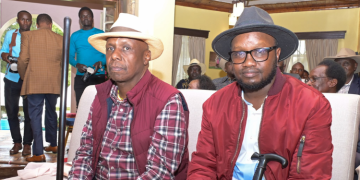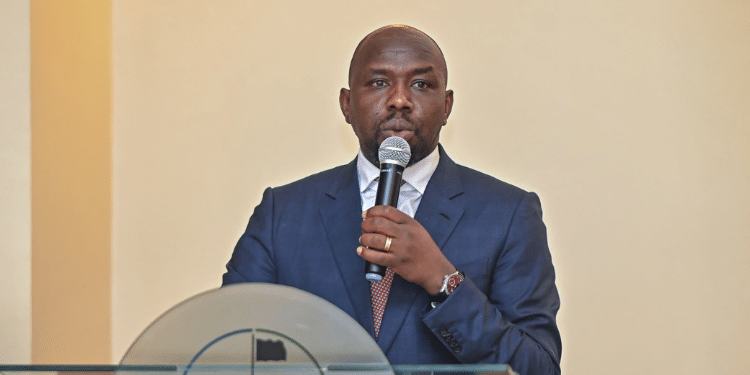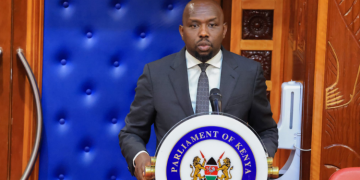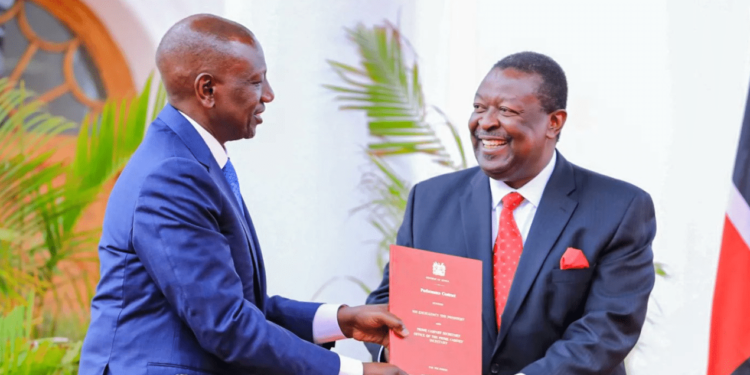The Kenya Foreign Policy 2024 presents a comprehensive framework for guiding the nation’s foreign relations and diplomatic engagements, with the aim of realizing collective aspirations.
The foreign policy objectives are structured around eight interlinked focus areas which have been identified as the cornerstones including peace and security diplomacy, economic and commercial diplomacy, oceans and blue diplomacy, global governance and multilateral diplomacy.
Additionally, the policy emphasizes environmental and climate change diplomacy, science, technology and innovation diplomacy, diaspora diplomacy, and socio-cultural diplomacy.
In the implementation of the new Foreign Policy, a ‘Whole-of-Government/Society Approach’ will be adopted to ensure interoperability.

8 Areas of New Foreign Policy
Peace and Security
The ultimate goal of Kenya’s peace and security diplomacy is to safeguard Kenya’s sovereignty and territorial integrity, preserve democracy and fundamental human rights, and ensure the prosperity and well-being of the people of Kenya.
It will also enhance regional capacity for conflict, mediation and negotiations and promotes conflict resolution including mediation, post conflict peace building and reconstruction.
Additionally, it will promote and expand Kenya’s peacekeeping and enforcement role globally, the role of women in peace and security, and realization of national food and nutrition security.
Also Read: Explainer: How Kenyans In Diaspora Can Benefit From Mobile Consular Services
Economic and Commercial Diplomacy
Central to Kenya’s economic and commercial diplomacy, is the promotion of economic empowerment of women, the youth, differently abled people and minority groups.
At the same time, it will focus on growing the country’s industrial and manufacturing capacity with a view of transforming Kenya into an export-driven, and globally competitive economy.
Ocean and Blue Diplomacy
The development of this sector aims to explore and develop ocean and inland water bodies resources, protect marine domain and boundaries, and combat maritime threats, enhance cooperation.
It also aims to utilize ocean and coastal space, protect the ocean environment and provide goods and services to support ocean and maritime activities and contribute to equitable sharing of ocean and marine resources and benefits.
Global Governance and Multilateral Diplomacy
Kenya’s Foreign Policy is premised on the reality of an ever-evolving, increasingly integrated, and interdependent world.
The diplomacy will promote respect for, and uphold the principles and purposes enshrined in the UN Charter and the AU’s Constitutive Act and foster collaboration in setting and implementing international norms and agendas.
Furthermore, it will champion reforms of global institutions to enhance diversity, equitable representation, transparency, accountability in decision-making, and responsiveness to the needs of member states.
Environment and Climate Diplomacy
The objectives of environmental and climate diplomacy focus on advocating for the scaling up of climate finance and reforming the global economic and financial systems to meet the needs of developing countries.
The area aims to strengthen global institutions such as the UNEP and the UN-Habitat.
Science, Technology and Innovation Diplomacy (STI)
Kenya’s STI diplomacy is a vital foreign policy tool, utilizing digital platforms and advanced technologies to strengthen its international relations and global presence.
The diplomacy will develop and promote transformative technologies that position Kenya as a key player in the global technology landscape and enhance investment in digital infrastructure, including at Kenya’s Silicon Savanna, Konza.
It will also foster sustainable technological growth, prioritize green Al, green technologies, supply chain diversification, strategic talent, and location decisions and strengthen a collaborative research agenda to advance Kenya’s technological capabilities.
Diaspora Diplomacy
Kenya’s Diaspora Diplomacy is hinged on a conceptual framework that protects, engages and empowers the Kenyan diaspora community to enhance their prosperity and that of the nation. The focus is on protecting, engaging and empowering the Diaspora.
This pillar will also ensure protection of the rights, welfare and interests of the Kenyan Diaspora community and support Kenyans to secure opportunities abroad.
Socio-Cultural Diplomacy
Socio-cultural diplomacy entails the use of a country’s culture, social practices, and values as tools to build relationships, foster understanding, and influence other nations.
It further entails people-to-people connections, which serve as means for soft power by creating a favorable global environment for engagements.
Besides, the key aspects of Kenya’s socio-cultural diplomacy include the use of culture and heritage, sports, education and health.
Also Read: How Kenyans in the Diaspora Are Stabilizing the Shilling
Key Institutions and Their Roles
The successful implementation of this policy is predicated on working in collaboration with MDACs and key stakeholders through a Whole of Government and Whole of Society Approach.
National Government Coordination Secretariat (NGCS), the principal technical coordination organ will play a central role in coordination and oversight during the implementation of this Policy.
Overall, there are a number of offices, public institutions and stakeholders who are instrumental in the implementation of the policy.
| INSTITUTION | ROLE |
| Citizenry | Influence the formulation, execution and provide feedback in shaping Kenya’s foreign policy discourse. |
| President | Chief diplomat and champions the implementation of this policy |
| Ministry of Foreign and Diaspora Affairs | Management of the Policy and responsible for the projection, promotion and protection of Kenya’s interest and image globally. |
| Civil Society Organisations | Raise awareness and mobilize public opinion, aligning with national foreign policy objectives |
Other institutions are academia, private sector, faith-based institutions, diaspora, the Media, development partners and international organizations women, youth, persons and labour organizations.
Additionally, it includes the National Security Council and Committee, Foreign Service Academy, Parliament, Judiciary, Ministries, Departments and Agencies, cabinet and County governments.
Monitoring and Evaluation
Monitoring and Evaluation of this Policy will be guided by the National Monitoring and Evaluation Framework.
The Government will use existing tools, including the MDAs the Strategic Plans, Annual Performance Contracts, Annual Work Plans, Annual President’s Report to track the implementation and reporting of this policy.
Besides, the implementation will be monitored, evaluated, and reported periodically to assess the achievement of the objectives, determine the gaps and challenges facing its implementation, and the corrective actions needed to ensure delivery of the intended results.
Follow our WhatsApp Channel and join our WhatsApp Group for real-time news updates.












































































